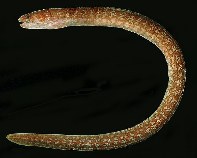| Family: |
Muraenidae (Moray eels), subfamily: Uropterygiinae |
| Max. size: |
29 cm TL (male/unsexed) |
| Environment: |
reef-associated; marine; depth range 0 - 35 m |
| Distribution: |
Indo-Pacific: East Africa to Easter Island, north to Marcus Island, south to Lord Howe and Rapa; Mariana and Marshall islands in Micronesia. |
| Diagnosis: |
Dorsal spines (total): 0-0; Dorsal soft rays (total): 0-0; Anal spines: 0-0; Anal soft rays: 0-0; Vertebrae: 121-132. Presence of a row of irregular or stellate pale spots which tend to be larger than those of A. cantonensis.
Description: Characterized by nearly uniform brown or mottled brown color with 3-4 horizontal rows of stellate, white blotches; white at lower part of head; yellow fins at tip of tail; body depth at gill opening 20-26 in TL; anus well anterior to middle of body, preanal length 2.2-2.5 in TL; two rows of jaw teeth; long and slender inner teeth; upper jaw with three median canines at front; anterior nostril in short tube; posterior nostril with low rim, above centre of eye; behind posterior nostril is a large sensory pore; fins restricted to end of tail; dorsal-fin origin slightly anterior to anal-fin origin (Ref. 90102). |
| Biology: |
Common among rubble, coralline algal debris, and coral heads of shallow wave-washed reefs (Ref. 1602, 58302). Benthic (Ref. 58302, 75154). Often found in tide pools. Sluggish eel (Ref. 1623), but may bite when provoked (Ref. 2334). |
| IUCN Red List Status: |
Least Concern (LC); Date assessed: 16 August 2011 Ref. (130435)
|
| Threat to humans: |
traumatogenic |
Source and more info: www.fishbase.org. For personal, classroom, and other internal use only. Not for publication.
